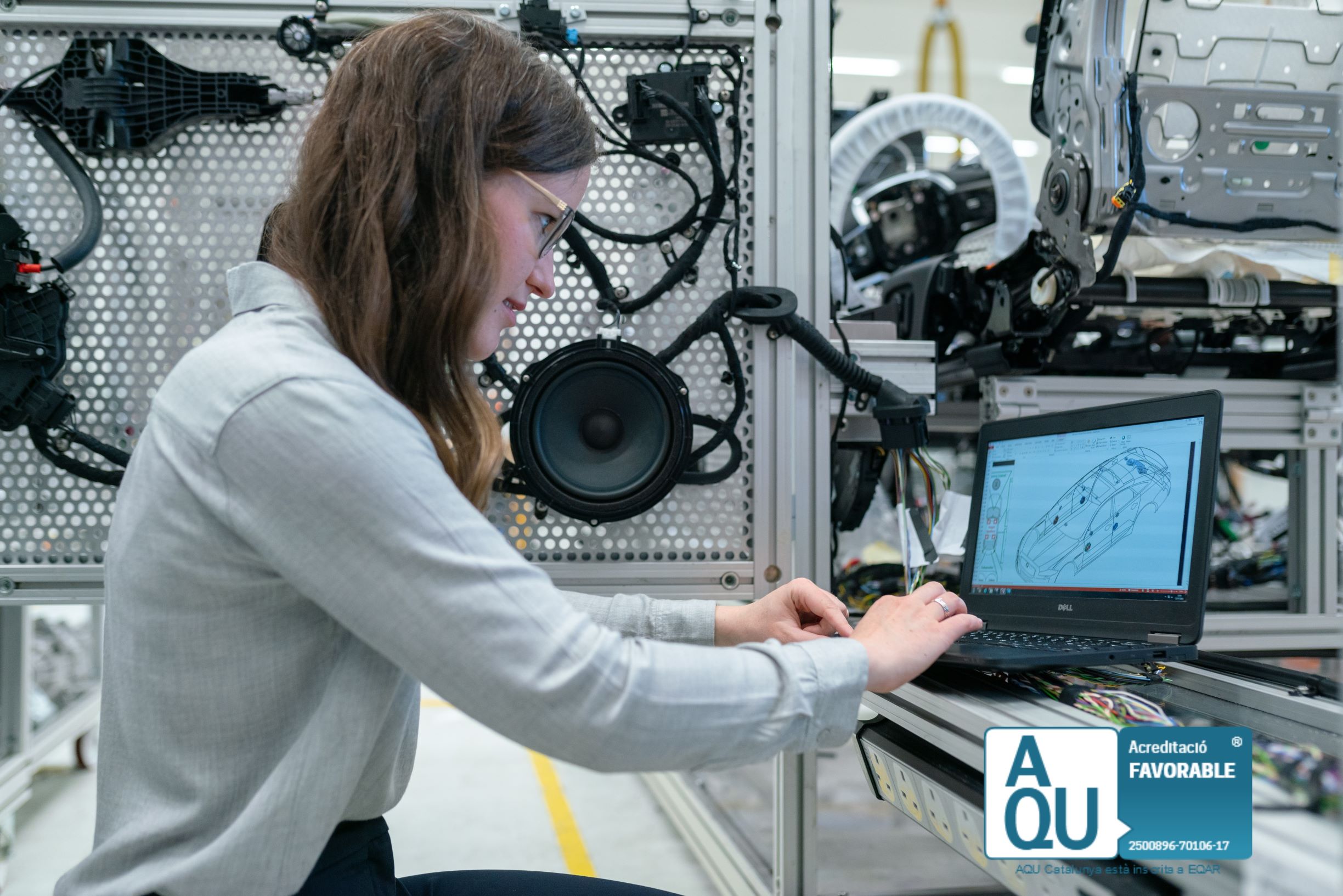The life cycle of a degree
The life cycle of a degree is regulated by Royal Decree 822/2021, of September 28, which establishes the organization of university education, and the procedure for ensuring its quality.
- Inicio
- Qualitat docent
- The life-cycle of a degree
Share
The VSMA framework
The Framework for Verification, Monitoring, Modification, and Accreditation of official degrees is a document agreed upon with Catalan universities through the deputy vice chancellors responsible for quality, along with the members of the Quality Technical Units in Catalan universities.
The VSMA framework links the processes of verification, monitoring, modification, and accreditation of the quality of official degrees in Catalonia, with the following purposes:
- Ensuring continuous evaluation of the teaching performance.
- Promoting a culture of both quality and accountability.
- Supporting university leaders in building the strategic vision of the education.
- Helping to reinforce university transparency, leadership, and social recognition.
VSMA
Verification is the first stage of the life cycle of a degree program. It consists of the prior evaluation of a new curriculum by quality agencies. In Catalonia, proposals for new official education programs must be developed following AQU Catalunya's Guidelines, the agency responsible for issuing verification reports.
This binding report is sent to the Council of Universities, the body responsible for verifying new degree programs. Once the degree program has been verified, the Generalitat must authorize its implementation, in accordance with the programming criteria established, along with the availability of funding.
Last but not least, the Council of Ministers establishes university degrees official status, consequently ordering their inclusion in the Register of Universities, Centers, and Degrees (RUCT).
This initial stage corresponds to the strategic process PE03 - Creation and Design of New Degree Programs of the SGIC, which can be consulted in the Process Handbook.
Once the degree program is operational, legal regulations require universities to conduct monitoring of the verified degree programs under the supervision of AQU Catalunya.
Currently, the assessment takes the centre as the unit of evaluation. In this model, the tracking reports combine cross-cutting dimensions and/or elements of the centre with specific dimensions for each and every degree program.
This process evaluates six standards (coincident with the accreditation process):
· Quality of the training program,
· Relevance of public information,
· Effectiveness of the Quality Assurance System,
· Adequacy of the teaching staff,
· Effectiveness of learning support systems,
· Quality of results.
EUSS produced a self-monitoring report for each degree program (IST) until the 2014-2015 academic year. From that moment forward, previous reports were substituted by the present centre monitoring report (ISC). This report includes all degree programs offered at our centre, incorporating an improvement plan that aligns with the centre’s objectives.
The responsibility for preparing the ISC lies with the Academic and Quality Commission, which collaborates with various groups and department heads to ensure that the resulting report is as comprehensive and informative as possible. Thus, the ISC is submitted to the UAB for inclusion in the UAB's University Monitoring Report (ISU).
The ISC also forms part of the mechanism used by quality agencies for the accreditation each program must achieve periodically (every 6 years for bachelor's degrees, and every 4 years for master's degrees).
The monitoring stage corresponds to the key process PC07 - Monitoring, Evaluation, and Program Improvement within the SGIC, and it can be consulted in Process Handbook.
Documentos adicionales
According to the VMSA framework, proposals for modifying the degrees can only result from the monitoring process and, therefore, are the natural and expected outcome of this process.
Needs, weaknesses, or areas for improvement may be identified during this process, and classified according to their degree of importance, ranging from minor changes implemented and documented in the monitoring reports - without requiring authorization from AQU Catalunya - to more profound changes which involve alterations in the structure, or in the nature and objectives of the verified titles. These changes require a specific modification process that must be submitted to AQU for approval.
The different types of modifications are defined in the Guide to the formulation and validation of proposals for recognised Bachelor and Master's degree programmes.
The modification stage corresponds to the key process PC08 - Modification and Extinction of QMS university degrees, which can be found in the Process Handbook.
Accreditation is the internal and external evaluation process of a degree program with the aim of assessing its quality, and demonstrating that it is being developed as planned during the verification process.
During this process, six standards are reviewed (coincidently with the monitoring process):
• Quality of the training program
• Applicability of the public information
• Effectiveness of the Quality Assurance System
• Adequacy of the teaching staff
• Effectiveness of the learning support systems
• Quality of the results
The internal evaluation process consists of the preparation of an accreditation self-report by the Academic and Quality Commission, which gathers the analysis and assessment of the degree programs through indicators and evidence, as well as an improvement plan.
The external evaluation is carried out by an External Evaluation Committee, and aims to verify the performance of a degree program through a visit to the institution. During this visit, various stakeholder groups will be interviewed: the institution's governing team, faculty, students, alumni, and employers. Based on this visit, and the analysis of the accreditation self-report, the external visit report - structured around the 6 previously described standards - is derived and sent to the specific commission for each area of AQU Catalunya, which will ultimately issue the accreditation report. This report can be favourable or unfavourable, and is structured into four levels: accredited with excellence, accredited, accredited with conditions, and not accredited.
This final stage corresponds to the strategic process PE05 - Accreditation of degrees in the IQAS, which can be consulted in the Guide for the Processes.
Documentos adicionales
Documentation of the degrees
Automation and Industrial Electronic Engineering
 VERIFICACIÓN
VERIFICACIÓN
- Informe favorable a la verificación (ANECA)
- Resolución de verificación (ANECA)
- Publicación del plan de estudios en el BOE
- Memoria del Grado en Ingeniería Electrónica Industrial y Automática
- Modificación aprobada el 4/06/2019 (AQU Catalunya)
- Modificación aprobada el 25/05/2020 (AQU Catalunya)
Mechanical Engineering
 VERIFICACIÓN
VERIFICACIÓN
- Informe favorable a la verificación (ANECA)
- Resolución de verificación (ANECA)
- Publicación del plan de estudios en el BOE
- Memoria del Grado en Ingeniería Mecánica
- Modificación aprobada el 4/06/2019 (AQU Catalunya)
- Modificación aprobada el 25/05/2020 (AQU Catalunya)
Engineering in Industrial Organization
 VERIFICACIÓN
VERIFICACIÓN
- Informe favorable a la verificación (ANECA)
- Resolución de verificación (ANECA)
- Publicación del plan de estudios en el BOE
- Memoria del Grado en Ingeniería en Organización Industrial
- Modificación aprobada el 7/06/2013 (AQU Catalunya)
- Modificación aprobada el 26/07/2019 (AQU Catalunya)
- Modificación aprobada el 22/10/2020 (AQU Catalunya)
Engineering in Renewable Energies and Energy Efficiency
 VERIFICACIÓN
VERIFICACIÓN
- Informe favorable a la verificación (AQU Catalunya)
- Resolución de verificación (Consejo de Universidades)
- Publicación del plan de estudios en el BOE
- Memoria del Grado en Ingeniería en Energías Renovables y Eficiencia Energética
- Esta titulación no ha pasado ningún proceso de modificación.
- Esta titulación no ha pasado ningún proceso de acreditación.
Automotive Engineering
 VERIFICACIÓN
VERIFICACIÓN
- Informe favorable a la verificación (AQU Catalunya)
- Resolución de verificación (Consejo de Universidades)
- Publicación del plan de estudios en el BOE
- Memoria del Grado en Ingeniería de Automoción
- Esta titulación no ha pasado ningún proceso de modificación.
- Esta titulación no ha pasado ningún proceso de de acreditación.


